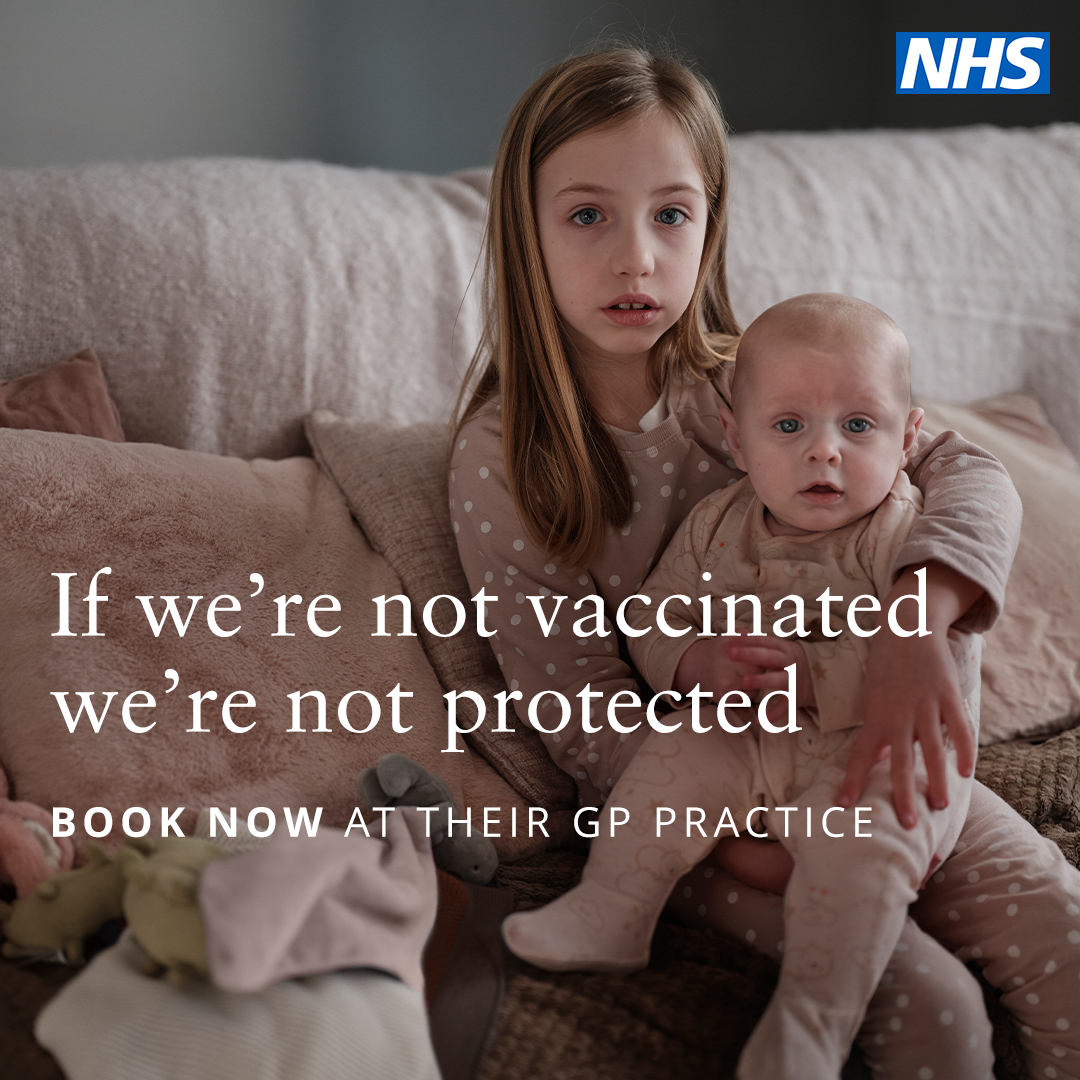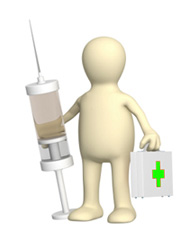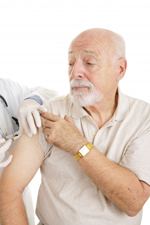
The UK’s childhood vaccination programme prevents around 5,000 deaths, and over 100,000 hospital admissions, each year in England.
Vaccinations have ensured the UK has been declared free of diseases such as polio, with others, like diphtheria, almost fully controlled. However, in recent years we have seen a trend of lower vaccine uptake, and this has been exacerbated by the pandemic.
Childhood infections like measles and whooping cough are rising around the country. If your child isn’t vaccinated, they’re not protected. It's important that vaccines are given on time for the best protection, but if your child missed a vaccine, contact the practice to catch up.
To have full protection, children sometimes need to have booster vaccines. You should check their red book or speak to the practice to see if they are missing any. If you are unsure speak to the practice or visit www.nhs.uk/childhoodvaccinations to find out if you should book an appointment for your child.
Preventable childhood infections can have a huge impact on a child’s life: they can miss out on education due to time spent unwell, be hospitalised, and have life-long complications such as deafness, blindness, encephalitis (infection of the brain) and paralysis. Sometimes they can cause death.
Please note: gelatine is a substance derived from the collagen of animals such as chickens, cattle, pigs and fish. Porcine gelatine is used in some vaccines as a stabiliser. This is to ensure that the vaccine remains safe and effective during storage. Porcine gelatine is found in two of the vaccines routinely given to children: the MMR vaccine and the nasal influenza vaccine.
In the UK we have two MMR vaccines. Both work very well, one contains porcine gelatine and the other doesn’t. If you want your child to have the porcine gelatine free vaccine discuss it with the practice nurse.
NHS England: Why vaccination is important and the safest way to protect yourself
Children's Immunisation Schedule
Here's a checklist of the vaccines that are routinely offered to everyone in the UK for free on the NHS, and the age at which you should ideally have them.
2 months:
- Diphtheria, tetanus, pertussis (whooping cough), polio and Haemophilus influenzae type b (Hib, a bacterial infection that can cause severe pneumonia or meningitis in young children) given as a 5-in-1 single jab known as DTaP/IPV/Hib
- Pneumococcal infection
 3 months:
3 months:
- 5-in-1, second dose (DTaP/IPV/Hib)
- Meningitis C
4 months:
- 5-in-1, third dose (DTaP/IPV/Hib)
- Pneumococcal infection, second dose
- Meningitis C, second dose
Between 12 and 13 months:
- Meningitis C, third dose
- Hib, fourth dose (Hib/MenC given as a single jab)
- MMR (measles, mumps and rubella), given as a single jab
- Pneumococcal infection, third dose
3 years and 4 months, or soon after:
- MMR second jab
- Diphtheria, tetanus, pertussis and polio (DtaP/IPV), given as a 4-in-1 pre-school booster
Around 12-13 years:
- Cervical cancer (HPV) vaccine, which protects against cervical cancer (girls only): three jabs given within six months
Around 13-18 years:
- Diphtheria, tetanus and polio booster (Td/IPV), given as a single jab
65 and over:
- Flu (every year)
- Pneumococcal
- Herpes Zoster (Shingles) - this is certain ages, please contact Reception to find out when you are eligible
Complete routine immunisation schedule
Click here for the recommended vaccination schedule from Public Health England
Seasonal Flu Vaccination
Influenza – flu – is a highly infectious and potentially serious illness caused by influenza viruses. Each year the make-up of the seasonal flu vaccine is designed to protect against the influenza viruses that the World Heal th Organization decide are most likely to be circulating in the coming winter.
th Organization decide are most likely to be circulating in the coming winter.
Regular immunisation (vaccination) is given free of charge to the following at-risk people, to protect them from seasonal flu:
- people aged 65 or over,
- people with a serious medical condition
- people living in a residential or nursing home
- the main carers for an elderly or disabled person whose welfare may be at risk if the carer becomes ill
- healthcare or social care professionals directly involved in patient care, and
- those who work in close contact with poultry, such as chickens.
Pregnant women & the Flu Vaccination
It is recommended that all pregnant women should have the flu vaccine, whatever stage of pregnancy they're in. This is because there is good evidence that pregnant women have an increased risk of developing complications if they get flu, particularly from the H1N1 strain.
Studies have shown that the flu vaccine can be safely and effectively given during any trimester of pregnancy. The vaccine does not carry risks for either the mother or baby. In fact, studies have shown that mothers who have had the vaccine while pregnant pass some protection to their babies, which lasts for the first few months of their lives.
COVID-19 Vaccinations
We will be rolling out the Covid-19 vaccination programme from September/October, you will be contacted by the practice when it is your turn to attend for yours.
Please do not contact Reception to ask when you are due, we will contact you directly.
All vaccinations take place at Silver Lane Surgery in Yeadon. If you are housebound we can arrange a home visit. We currently run Saturday clinics, and also some small weekday clinics.
These links all come from trusted resources but if you are unsure about these or any other medical matters please contact your doctor or pharmacist for advice
